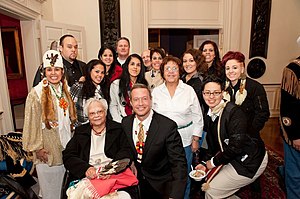Wesorts
Many individuals with the surnames Proctor, Newman, Savoy, Queen (name), Butler, Thompson, Swann, Gray, and Harley claim that Native heritage.
"[1] Historian Frank Sweet lists "Wesorts" as among a group of "derogatory epithets given by mainstream society, not self-labels".
[3] In the early 1930s, weekend-farmer Alice Ferguson noticed that people were finding small artifacts in her fields and decided to do some digging around, according to newspaper reports.
[4] Wayne Karlin's novel The Wished For Country (2002) represents the origins and struggles of the Wesorts as a multicultural people in the early days of Maryland's first European settlement at St. Mary's City.
The Los Angeles Times reviewed The Wished-For Country as a contribution to the history of "the common people," calling the book "an attempt in novel form to bring to life the original Wesorts and their turbulent world.
